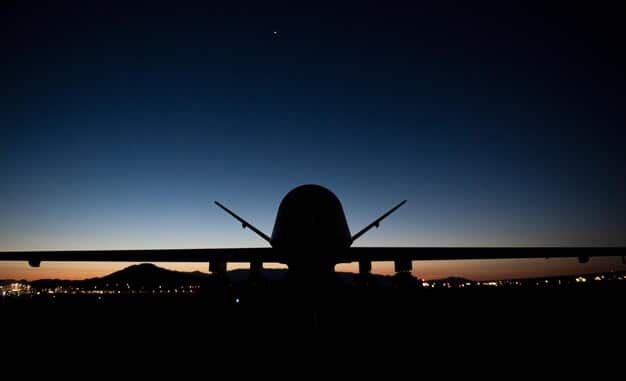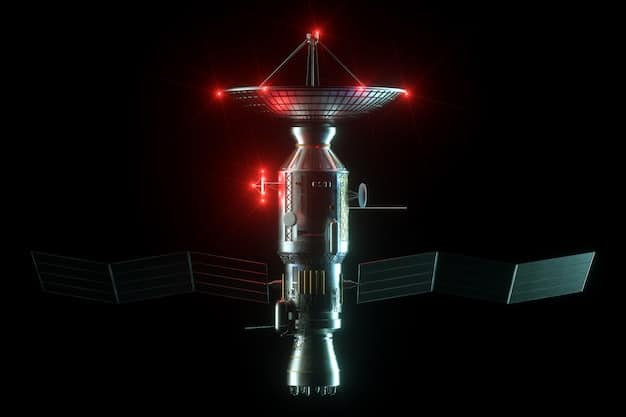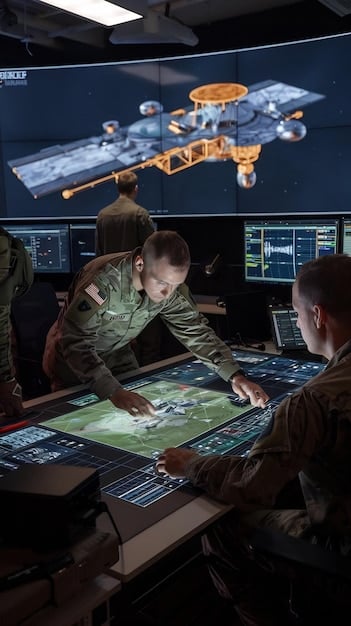Space Force Developments: Implications for US National Security

The latest Space Force developments have significant implications for national security, including enhanced space domain awareness, improved capabilities for protecting U.S. assets in space, and potential impacts on international relations and strategic competition.
The United States Space Force (USSF) has rapidly evolved since its establishment in 2019. But, what are the implications of the latest Space Force developments for national security? This article explores the critical aspects of these advancements, from technological capabilities to strategic impacts.
Understanding the Space Force’s Mission
The Space Force’s primary mission is to protect U.S. interests in space. Since its inception, its role is to organize, train, and equip space forces to ensure freedom of operation in space and provide space capabilities for the joint force.
Securing Space Assets
One of the critical implications of the Space Force is its commitment to securing U.S. space assets. These include communication satellites, GPS systems, and surveillance platforms. The Space Force aims to deter attacks and defend these assets from potential adversaries.
Enhancing Space Domain Awareness
Space domain awareness (SDA) is a vital component of national security. The Space Force enhances SDA by tracking and monitoring objects in space, identifying potential threats, and providing early warning of impending dangers. Improved SDA allows the nation to respond more effectively to threats.
- Protecting satellite constellations from cyberattacks.
- Tracking and identifying debris that could pose a threat to spacecraft.
- Monitoring adversary actions in space to deter aggressive behavior.
In essence, the Space Force provides a critical line of defense, ensuring America’s ability to operate in space is maintained and safeguarded.

Technological Advancements and Capabilities
The Space Force relies on cutting-edge technology to achieve its objectives. The development and deployment of advanced space-based systems are crucial for maintaining superiority in space.
Advanced Surveillance Systems
The Space Force is investing in advanced surveillance systems to monitor activities in space. These systems can detect and track objects with greater precision, improving overall space domain awareness. With early threat detection, the USSF ensures prompt responses.
Communication Infrastructure
Reliable communication is vital for military operations, and the Space Force ensures secure and resilient communication infrastructure. Advancements in satellite communication technology are enhancing the ability to transmit data and coordinate activities.
- Developing more secure and reliable satellite communication networks.
- Implementing advanced encryption techniques to protect sensitive data.
- Improving bandwidth and data transmission speeds for real-time communication.
The Space Force’s focus on these advancements ensures its ability to protect U.S. interests in space far into the future.
The Space Force and Deterrence Strategies
Space has become a new frontier for military strategy, thus requiring new understandings of deterrence. Here’s how the Space Force contributes to deterrence.
Deterring Aggression in Space
The Space Force plays a critical role in deterring aggression in space. By demonstrating the capability to respond to attacks effectively, the U.S. seeks to discourage others from initiating hostile actions.
Strengthening International Alliances
Collaborating with international partners is crucial for maintaining stability in space. The Space Force works with allies to share information, conduct joint exercises, and develop common strategies to address shared threats. These alliances amplify the USSF’s deterrent effect.
- Participating in joint exercises with allied space forces.
- Sharing intelligence and data on space activities and potential threats.
- Coordinating policies and strategies on space security issues.
Through these efforts, the Space Force contributes to a more secure and stable space environment, benefiting the U.S. and its allies alike.

Implications for Global Competitiveness
Space is not only a military domain but also a vital arena for economic competition. The Space Force helps to ensure that the United States remains competitive in the space sector through the maintenance of space-based assets.
Supporting Commercial Space Activities
The commercial space sector is growing rapidly, and the Space Force supports these activities by providing secure and reliable access to space through secure access and reliable launch services and protecting commercial satellites from potential threats.
The Space Force helps American companies compete effectively in the global market.
Protecting Intellectual Property
Protecting intellectual property in space is crucial for fostering innovation. The Space Force works to prevent the theft of sensitive data and technology, which could undermine U.S. competitiveness thus safeguarding research and development efforts.
- Collaborating with commercial space companies to ensure secure satellite launches.
- Providing data and intelligence on potential threats to commercial space assets.
- Supporting the development of secure communication technologies for space-based activities.
By supporting this sector, the Space Force is ensuring the US remains at the forefront of the rapidly expanding global marketplace.
Addressing Threats and Challenges
The Space Force faces various threats and challenges that must be addressed to maintain its capabilities and effectiveness. Strategic planning is vital to ensure a continuous leading edge.
Countering Cyber Threats
Cyber threats are a significant concern for space-based systems. The Space Force is working to enhance cybersecurity measures to protect satellites and ground-based infrastructure from attacks. Through rigorous testing and constant upgrades it ensures its systems remain robust and resilient.
Responding to Anti-Satellite Weapons
The development and testing of anti-satellite (ASAT) weapons by some nations pose a direct threat to U.S. assets in space. The Space Force is focused on developing capabilities to deter and respond to the use of these weapons which includes tracking such weapons in foreign nations.
- Developing advanced cyber defense technologies for space systems.
- Enhancing monitoring and detection capabilities for cyberattacks.
- Training personnel to respond effectively to cyber incidents.
By developing clear strategies the Space Force ensures its abilities to deter attacks remain strong.
The Future of the Space Force
The Space Force is continually evolving to meet emerging threats and challenges. Long-term planning and innovation are essential for ensuring this evolution allows the USSF to maintain an advantage.
Expanding Space Capabilities
Future developments will likely include expanding space capabilities, such as developing advanced satellite systems and improving space domain awareness. This includes the development of next-generation technologies and the integration of artificial intelligence as well as advanced robotics.
Enhancing Collaboration
The Space Force will need to enhance collaboration with other military branches, government agencies, and international partners to address shared challenges. These partnerships are essential for sharing resources, expertise, and intelligence.
- Investing in research and development of new space technologies.
- Improving space domain awareness capabilities.
- Developing advanced satellite communication systems.
Through proactive initiatives, the future of the Space Force will be marked by continuous growth, innovation, and global partnerships that ensure its effectiveness and the security of space-based assets.
| Key Aspect | Brief Description |
|---|---|
| 🛡️ Protecting Space Assets | Ensuring U.S. satellites and space infrastructure are secure from attacks. |
| 🛰️ Space Domain Awareness | Monitoring and tracking objects in space to identify potential threats. |
| 🤝 International Collaboration | Working with allies to share information and strategies for space security. |
| 🚀 Innovation and Tech | Investing in the innovation and development of space tech to promote USA dominance in space. |
Frequently Asked Questions
▼
The primary mission of the Space Force is to organize, train, and equip space forces to ensure freedom of operation in space and provide space capabilities for the joint force. It also supports US allies within the international space community.
▼
The Space Force enhances national security by protecting U.S. space assets, improving space domain awareness, deterring aggression in space, and supporting commercial space activities. It constantly monitors for potential and current threats to the US and its allies.
▼
The Space Force is investing in advanced surveillance systems, secure communication infrastructure, and cyber defense technologies. These advancements enhance its ability to monitor, communicate, and protect space-based assets thus providing further early warnings.
▼
The Space Force addresses cyber threats by enhancing cybersecurity measures, improving monitoring and detection capabilities, and training personnel to respond effectively to cyber incidents. It ensures its systems are robust and resilient against cyber-attacks.
▼
The Space Force collaborates with international partners by sharing information, conducting joint exercises, and developing common strategies to address shared threats, thus keeping the US and her allies safe. This ensures the development of effective international space policies.
Conclusion
In conclusion, the ongoing developments within the Space Force have profound implications for national security, spanning technological advancements, deterrence strategies, and global competitiveness, leading to both challenges and opportunities. The Space Force ensures America’s interests in space are protected and that peace via strength is maintained.





